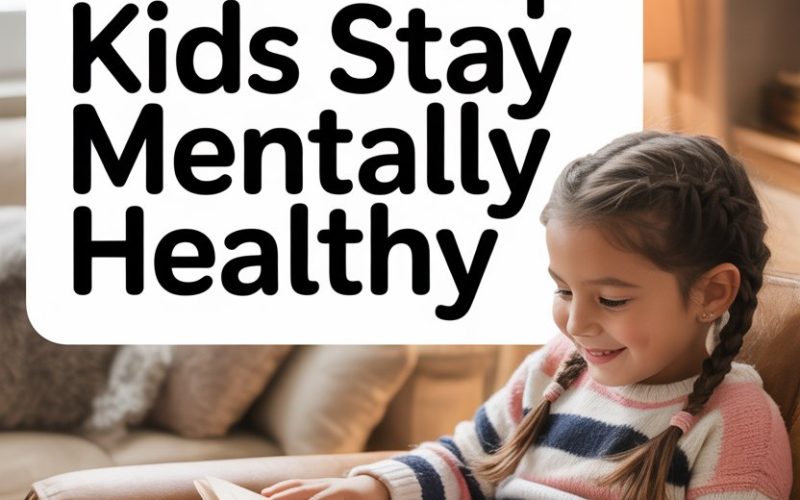Let’s be honest—between lost permission slips, perpetual snack negotiations, and whatever “slime” is stuck to the remote, parenting rarely feels serene.
Still, amid the daily chaos, helping kids keep their heads (and hearts) in a good place is right up there with making sure their shoes match.
The good news? A handful of simple habits, rooted in science, can seriously boost your child’s mental health, whether they’re four or fourteen.
Here are five essentials that really do help kids stay mentally healthy—without requiring a major lifestyle overhaul or an extra hour in the day.
1. Strong Connections with Grown-Ups Who Care
No mental health toolkit works without this crucial bit: solid, steady relationships.
Turns out, the single biggest predictor of a child’s resilience isn’t fancy therapy or cutting-edge apps, but at least one adult who reliably shows up, listens, and loves.
If you’re reading this, you’re probably already that person (even if some days you only show up via WhatsApp).
Hugs, high-fives, a wink at the breakfast table—all the little ways you connect add up.
The Harvard Center on the Developing Child has found that consistent, responsive caregiving is the bedrock of healthy brain development and emotional wellbeing.
Kids need grown-ups who see them, hear them, and take their feelings seriously—yes, even the ones about their sandwich being “cut wrong.”
Don’t burn yourself out trying to be the world’s most attentive parent. Small, repeated acts count far more than grand gestures. Share a joke, fold socks together, listen to their retelling of the playground drama.
Most of all, show them you’re in their corner, even when you’re both running on fumes.
If you’re co-parenting or raising kids in a blended or extended family, every caring adult counts. Aunties, granddads, godparents, the neighbour who always waves—these supportive relationships form a safety net that makes all the difference.
2. Sleep That’s Actually Sleep
If you’ve ever tried reasoning with a six-year-old who’s missed their nap, you know what sleep deprivation looks like.
And, let’s be real, you may have also experienced the grown-up version: blankly staring at a mug of coffee and hoping it’ll parent your children for you.
Sleep does more than keep crankiness at bay. Research consistently shows that proper rest is crucial for children’s emotional regulation, attention span, and even physical health.
A 2021 study in JAMA Network Open found that children who get enough sleep are less likely to experience emotional and behavioural difficulties.
Setting a consistent bedtime routine is more valuable than any “miracle” gadget on the market. That doesn’t mean you need to run your household like a boot camp.
Maybe you dim the lights, read one more chapter, or play sleepy music. (No need to get fancy—a Spotify playlist of rain sounds counts.)
Screens are the arch-nemesis of sleep quality. The NHS recommends switching off tablets and TVs at least an hour before bed, even if that means enduring a bit of pre-bed “I’m bored!” drama.
If you’re worried your child’s sleep is off, a simple sleep diary can help you spot patterns and gently problem-solve.
And yes, sometimes the routine goes out the window. Holidays, sleepovers, the cat gets stuck in a cupboard—life happens. Children are pretty resilient, and a few off-nights won’t ruin them for life.
3. Open Conversations About Feelings (Even the Weird Ones)
Kids aren’t born knowing how to talk about their feelings (frankly, neither are most adults). Giving them the language—and the permission—to share what’s going on inside can be transformative.
You don’t need a psychology degree or a rainbow of puppets. Try naming feelings as they come up: “You’re really disappointed we can’t go to the park.” Or, for the drama-prone among us: “That maths test made you feel like a squashed pancake.”
Labelling emotions helps kids learn that feelings aren’t scary or shameful—just part of being human.
A great way to open the door is by narrating your own emotions (in a non-terrifying way). “I’m feeling a bit stressed about work, so I’m going to take a few deep breaths.”
This normalises ups and downs, and shows your child healthy coping in action.
If you suspect your child is struggling but clams up when you ask “How are you feeling?”, try chatting while you do something else—washing up, walking the dog, colouring.
Eye contact isn’t always necessary, and a bit of distraction can make tough topics less intimidating.
Sometimes, big feelings need extra help. If your child’s mood, sleep, or behaviour changes dramatically, or they talk about hurting themselves, reach out.
In the UK, YoungMinds has superb resources and advice for parents, while Kids Helpline is a go-to in Australia.
4. Movement—Yes, Even if They Hate Sport
Don’t worry, this isn’t a sermon about marathons or competitive swimming. Physical activity is about moving bodies, not winning medals.
The mental health benefits of movement are massive: regular physical play reduces anxiety, boosts mood, and even sharpens thinking skills.
UK guidelines recommend at least an hour of moderate activity daily for children (think: running, cycling, skipping, dancing to Taylor Swift in the lounge).
The good news is, there’s no need to sign up for elite gymnastics or spend £60 on trainers. Local parks, back garden games, or even living room obstacle courses count.
Some kids love sport; others would sooner eat broccoli. Sneak movement into everyday life with a bit of creativity. Challenge them to race you upstairs, play “the floor is lava,” or have a five-minute disco break while dinner cooks.
If your child is body-conscious or feels excluded at school, non-competitive activities like swimming or yoga can be a gentler way in.
If you’re worried about screen time squeezing out active time, check out the NHS Change4Life campaign, which offers bite-sized ideas for getting kids moving (and doesn’t judge if you join in wearing pyjama bottoms).
5. Time to Play and Be Bored
Here’s something that gets overlooked in the age of after-school clubs and jam-packed timetables: children need space to mess about, daydream, and do glorious nothing. Free, unstructured play isn’t just fun—it’s rocket fuel for mental health.
Child psychologists agree that play helps children work through worries, build friendships, and practice problem-solving.
A study by the American Academy of Pediatrics found that play is essential for children’s cognitive, social, and emotional development.
Yet, faced with the temptation to fill every spare moment with “enrichment,” it’s easy to forget that rolling around in the mud or building an epic Lego tower is plenty enriching.
Boredom has a bad rap, but it’s a hidden superpower. When children have time to be bored, their brains get busy inventing games, stories, and solutions to the “I’m booooored!” problem. That’s creativity in action.
Try resisting the urge to leap in with a list of activities. Give your child the time and permission to figure it out. (Earplugs available where all good parenting supplies are sold.)
Not all families have the luxury of long afternoons with nothing scheduled. Even carving out small oases of playtime, where kids can choose what they do, can have a big impact.
And if they invent a superhero with a sock for a hat? Applaud the genius.
Everyday Mental Health—No Magic Wand Required
Parenting sometimes feels like a quest for secret hacks, but the real keys to mental health aren’t hidden in a self-help aisle or an Instagram feed.
They’re in the everyday stuff: laughter, bedtime stories, a walk around the block, the world’s worst knock-knock joke.
These five habits work quietly behind the scenes, helping your child’s mind and heart to weather life’s bumps.
And if you’re reading this while hiding in the loo with a biscuit, you’re probably doing the most important thing of all—showing up, loving them, and muddling through, one perfectly imperfect day at a time.





